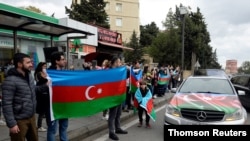Azerbaijan has announced the capture of a key city in the Nagorno-Karabakh enclave, but Armenia has denied the claim.
Speaking to the nation on television Sunday, Azerbaijan’s President Ilham Aliyev said that Azerbaijani forces had taken Shushi (Shusha in Azeri), the second-largest city in the disputed territory.
“The city of Shusha has been liberated from occupation. Shusha is ours. Karabakh is ours," Aliyev said, adding that his country will continue its fight until Armenian forces withdraw from the territory.
Aliyev’s statement prompted celebration in Azerbaijan’s capital, Baku, where people were waving flags and chanting slogans, and drivers sounded their car horns.
The Armenian Defense Ministry denied that Shushi was captured but confirmed heavy fighting in and around the city.
A ministry spokesman, Artsrun Ovannisian, said late Sunday that fighting in and around Shushi was continuing. “Neither side fully owns the initiative,” Ovannisian said.
Officials from the Nagorno-Karabakh region also denied Aliyev's statement.
"Shushi remains an unattainable pipe dream for Azerbaijan. Despite heavy destruction, the fortress city withstands the blows of the enemy," the Nagorno-Karabakh emergencies committee said.
The committee also reported strong fighting in other parts of the enclave, including the large eastern town of Martuni.
Shushi, a strategic city in Nagorno-Karabakh about 10 kilometers south of the region’s capital of Stepanakert, lies along the main road connecting the enclave with Armenia.
Shushi has also cultural significance for Azerbaijan, as it was once the center of its culture, where noted musicians and poets lived.
The ongoing fighting between Azerbaijan and Armenia erupted on September 27 and has claimed at least 1,000 lives, marking the largest escalation of the decades-old conflict over the breakaway region of Nagorno-Karabakh.
The predominantly ethnic Armenian territory declared its independence from Azerbaijan in 1991 during the collapse of the Soviet Union, sparking a war that claimed the lives of as many as 30,000 people before a 1994 cease-fire. However, that independence is not internationally recognized.





